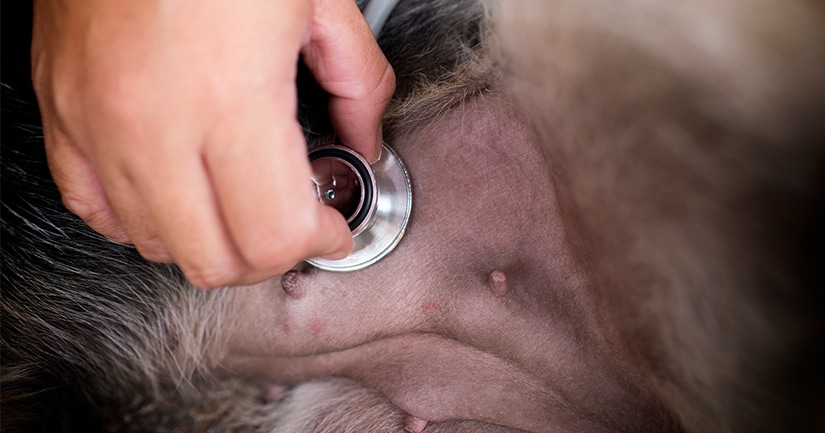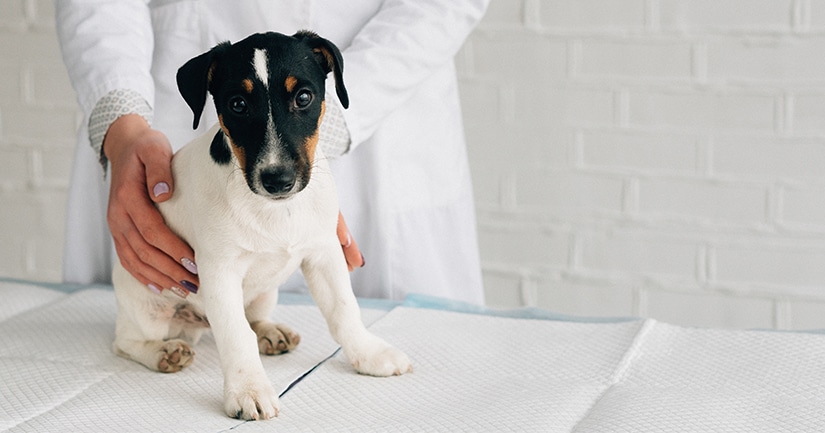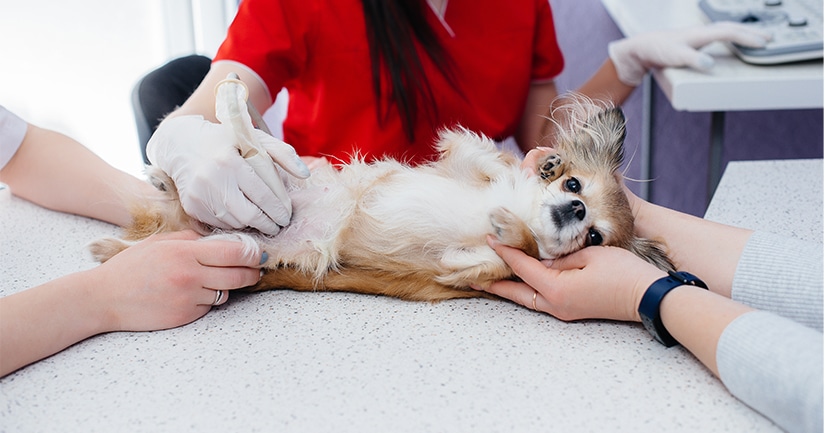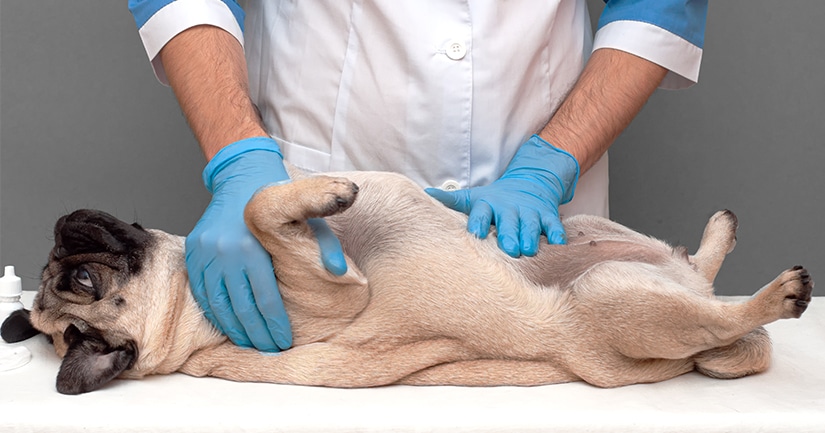Irritable bowel syndrome (IBS) refers to gastrointestinal infections that cause inflammation and irritation of the digestive tracts mucus membranes. This includes the large and small intestines and the stomach. It is thought that some suspected factors that may trigger IBS are related to food intolerances, food allergies, and the inability of food to pass through the gastrointestinal tract.
Stress may also come into play. Irritable bowel syndrome is usually linked to chronic inflammation and discomfort of the bowels. Symptoms include bloat, nausea, constipation, diarrhea, stomach pain, and loss of appetite. Keep in mind that IBS and IBD are two separate ailments, with IBS being a syndrome and IBD a disease.
In this blog, we’ll discuss the causes, symptoms, and treatment of IBS in dogs.
7 Causes of IBS in Dogs
You may not be able to determine the actual cause of your dog’s irritable bowel syndrome; there are four potential causes:
- Abnormal colon motility:This means your dog’s intestines overreact to food or stress.
- Fiber deficiency: This means that your dog does not have enough good fiber in his diet and can result in diarrhea or constipation.
- Food allergies: This means your dog may have allergic reactions to foods that contain things like lactose or wheat.
- Stress: This means your dog may suffer from anxiety or be nervous, which could result in irritable bowel syndrome.
- Genetic predisposition with multiple family members sharing this condition
- Dietary factors: pet foods are highly processed with added low-fiber ingredients like corn, various flours, and potatoes. Low-quality ingredients
- Supplements and Drugs: certain drugs and supplements can cause symptoms that are similar to IBS.
Symptoms of IBS in Dogs

Watch for these common symptoms of IBS:
- Abdominal pain – you can see if your dog reacts when you touch his abdominal area.
- Constipation – your dog may have pain related to relieving himself and become constipated.
- Diarrhea – your dog may have large bowel diarrhea that includes mucus.
- Loss of appetite
- Weight Loss
- Fever
- General malaise
While diagnosing IBS, your vet will also screen for the following:
- Dietary intolerance
- Inflammatory Colitis
- Pythiosis
- Whipworms
- Colonic tumors i.e., colonic neoplasia
- Histoplasmosis
- Giardiasis
- Clostridium perfringens
- Fiber induced diarrhea
- Cecal Inversion
When all these have been ruled out, the only likely prognosis will be IBS. Your vet will then work on a treatment plan to help with your pup’s diarrhea and pain.
Treatment of Irritable Bowel Syndrome in Dogs
When visiting your veterinarian, you’ll need to give a complete history of your dog’s health, onset of symptoms, and recent bowel movements and activities. Your vet will then perform a thorough examination on your dog, all the while taking into account your pup’s background history of all symptoms and incidents resulting in his present condition. By doing so, you’ll rule out all other health conditions or other potential causes of large bowel diarrhea.
Treatment of IBS is usually outpatient, and your vet will recommend feeding your pup a highly digestible diet with lots of fiber. This will help to restore and maintain normal digestive body functions. Your vet will also recommend that all stressful triggers be removed from your dog’s environment.
Living & Management

Once your pup has been diagnosed, you’ll need to keep an eye on your dog’s stool for consistency and also watch out for constipation and abdominal discomfort. A growing number of pet parents are turning to herbs for IBS management and relief.
- Increase fiber – Check with your vet and add more fiber to your dog’s daily diet
- Decrease stress – Avoid situations that contribute to your dog’s anxiety or could make him nervous. This means you may want to avoid too many people or too much noise in your dog’s daily activities. You can observe IBS in dogs to see what activities improve their condition or make it worse.
- Basil – Sprinkle basil in your dog’s food to relieve anxiety and inflammatory bowel disease.
- Plantain – Plantain is a backyard weed that’s good for diarrhea and chronic bowel disease and a great source of dietary fiber. Put plantain leaves in your blender or juicer and give your dog one teaspoon daily for every 20 pounds.
- Selenium – Selenium, a powerful antioxidant, may help avert irritable bowel disorder (IBD). Choose from these herbs or plants for the best selenium source: chamomile, garlic, ginseng, lemongrass, nettle, and wheatgrass. Add up to 1/4 teaspoon daily to your dog’s food.
- Thyme – Thyme helps settle your dog’s stomach, IBS in dogs, and problems like diarrhea. Pour 1/4 cup cool thyme leaf tea in your dog’s water bowl or add a pinch of thyme to her food once daily.
- Licorice – this is an effective tonic for the digestive system and also offers anti-inflammatory benefits.
- Slippery Elm – is effective in treating digestive disorders in dogs and also offers trace elements which include:
- Manganese
- Iodine
- Protein
- Mucilage

These all work together and soothe the mucous membranes and improve overall health in pets with IBS.
Your vet may prescribe an antibiotic even if the cause of diarrhea and other symptoms is unknown. Your vet may also prescribe a steroid medication to reduce inflammation in the digestive tract. This works for short-term needs, yet if the symptoms are not severe, more holistic approaches work well with fewer side effects.
That said, if your pup has dark-colored or bloody diarrhea that is severe with lethargy and vomiting together with vomiting and loss of appetite, you should reach out to your vet as soon as possible.
As with all holistic treatments, the final goal is to support your dog’s digestive tract’s health and proper functioning while reducing inflammation, improving digestion, and replenishing beneficial flora.
As with all holistic treatments, the final goal is to support your dog’s digestive tract’s health and proper functioning while reducing inflammation, improving digestion, and replenishing beneficial flora. Natural remedies together with treatment plans are an excellent solution to help your pup feel better. Yet, they are not a solution or replacement for veterinary care.
